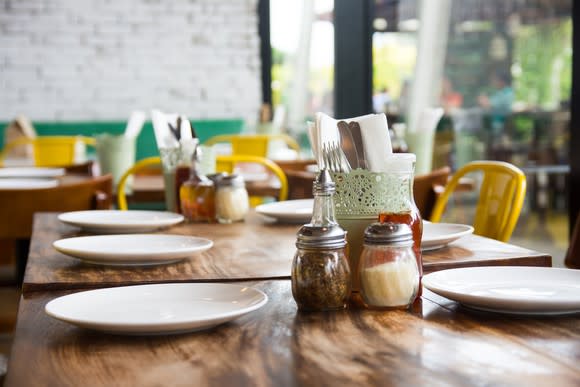How Restaurants Make Their Money
Like any small business, restaurants make money by selling more than they spend. The challenge for eateries compared to say a retailer or a hair salon is that food expires -- some of it very quickly.
As a restaurant owner that means formulating a menu where you both control costs and waste. For example, dry pasta lasts a long time and it's very inexpensive. Fresh fish may only have a shelf life of a day or two so if the salmon special fails to sell, you can end up spending money with no return on investment.
For restaurant owners, creating a menu is a balancing act. You need to entice customers while also making sure that you don't end up with excess unused food.

Do the math before you open a restaurant. Image source: Getty Images.
What are the costs of a restaurant?
Restaurants, like many types of businesses, have both fixed and variable costs. Your fixed costs include (but may not be limited to) the following:
Rent/property costs: In most cases, you will pay a set amount of rent each month. If you own the property you will still have costs like taxes and insurance.
Insurance: You will need business insurance to cover everything from potential property damage to liability if a customer gets sick.
Salaries: If you have any salaried employees, those are fixed costs (whereas hourly workers are an adjustable cost).
Your variable costs are ones you have some control over. Again, these are just the highlights, and your costs may vary.
Hourly salaries: This includes anyone who only gets paid if they work. As opposed to salaried workers, hourly workers are an expense that you can adjust depending on business needs.
Food: Since you cant go to the grocery store as each customer orders, you will need to buy some food and ingredients before you open each day.
Utilities: Electricity, heating, and sometimes even your phone bill will likely not be a steady number.
Advertising: Unless you are located in a high-traffic area, chances are you're going to have to spend some money to let people know your eatery exists.
Perhaps the most important thing you can do as a restaurant owner is to understand and manage your costs. You'll incur plenty of costs just getting everything set up, but it's essential to have an understanding of the costs you'll have to cover on an ongoing basis. Before you even open you should have a solid idea how much business you need to do in order to make a consistent profit.
How do restaurants make money?
To make it very simple, you need the markup from everything you sell to cover your costs and produce an excess. Let's say your eatery sells only cheeseburgers, fries, and a soda for $10. Maybe that meal costs you $2 in food costs and another $1 in variable costs in order to get it to the customer.
That means you have $3 in costs and $7 left over. Once the money that's coming in covers your costs, then you are profitable.
Running a profitable restaurant is harder than it sounds. Offering good food sometimes isn't enough -- even a busy establishment can be sunk by high rents or competition limiting what you can charge.
Take a realistic approach to calculating whether your dream restaurant has a chance at making money. Can you really sell enough at the right price to produce a profit?
If you crunch the numbers and find that you can't, then you have to make changes. That might mean selling items that cost less, opening for more (or less) hours, changing the menu, or finding a different location.
Restaurants fail at a rate of between 50% and 60%, according to data reported by POS Sector. That's higher than the overall rate for small businesses, and your best way to avoid that fate is to know if your concept can plausibly make money before you open.
More From The Motley Fool
The Motley Fool has a disclosure policy.

 Yahoo Finance
Yahoo Finance 